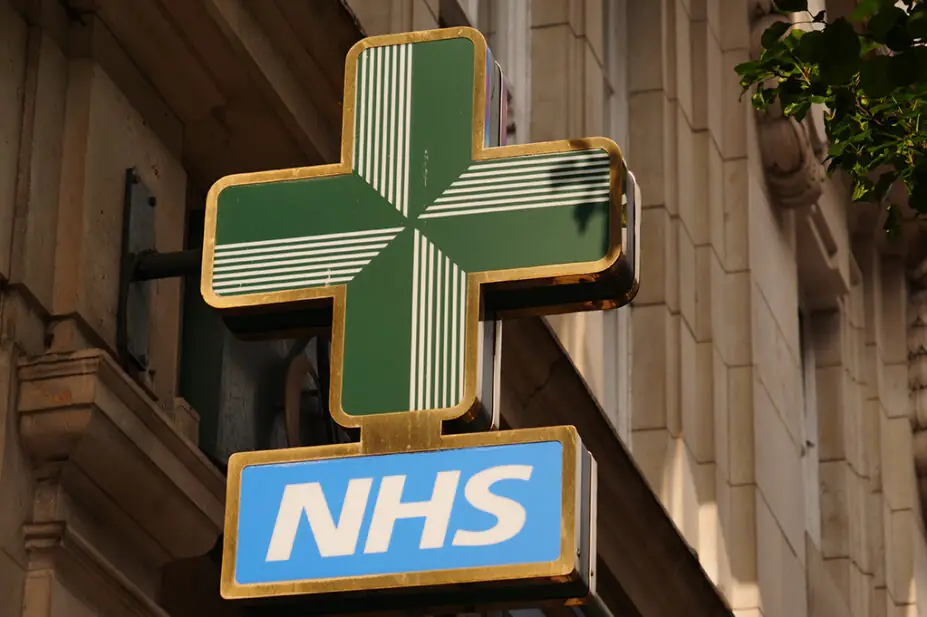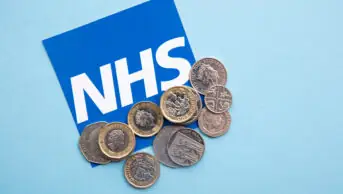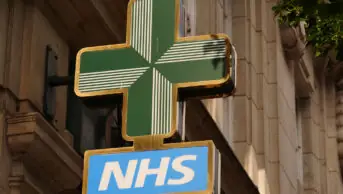
Shutterstock.com
Community pharmacies in England have missed out on a total of £71,690,000 to date in Pharmacy First threshold payments, analysis by The Pharmaceutical Journal can reveal.
Payments were missed either because the pharmacies did not deliver the required number of clinical pathway consultations or because they have not signed up to provide the Pharmacy First service (estimated to be around 2% of pharmacies in England).
And, according to the most recent figures published by NHS Business Services Authority, a record 6,551 pharmacies — 62% of the community pharmacy network in England — did not receive the payment in May 2025.
Since the service was launched at the end of January 2024, the number of clinical pathway consultations each pharmacy had to provide for the £1,000 monthly payment has increased incrementally from 1 to 30. Almost every time the threshold has increased, so has the number of pharmacies failing to meet it.
In February 2024, pharmacies had to provide one clinical pathway consultation to receive the £1,000 monthly payment. However, 1,553 pharmacies in England did not do so — missing out on a potential total of £1,553,000.
For March and April 2024, pharmacies had to provide five clinical pathway consultations to be eligible for the payment but, in March, 2,347 pharmacies did not do so, followed by 2,271 pharmacies in April — bringing the total missed threshold payments to £6,171,000.
In May 2024, the threshold for the monthly payment rose to ten clinical pathways, but 3,429 pharmacies did not deliver this, bringing the total of missed threshold payments to £9.6m.
The threshold increased again in August 2024 to 15, when 4,655 pharmacies did not receive the £1,000 monthly payment.
When the threshold increased to 20 in September 2024, 6,240 pharmacies in England did not provide the required number of clinical pathway consultations for the monthly payment, followed by 5,631 pharmacies missing the target in October 2024.
The threshold remained at 20 throughout November and December, with the number of pharmacies failing to meet it decreasing to 5,193 and 4,462, respectively.
But when the threshold rose again in January 2025 to 25 clinical pathway consultations, the number of pharmacies failing to meet the threshold or provide the service rose to 5,665.
The threshold increased to 30 consultations in March 2025, when 5,972 pharmacies did meet the target.
This was exceeded by 6,551 pharmacies that delivered 29 clinical pathway consultations or fewer in May 2025, bringing the total of potential missed threshold payments to £71,690,000 overall.
In response to The Pharmaceutical Journal‘s findings, a spokesperson for Community Pharmacy England (CPE) said that recently agreed changes to the clinical pathway “gateway” points, at which a payment is made, “should make the monthly threshold more achievable”.
The two-year community pharmacy contract, published in March 2025, announced that from June 2025, an interim £500 payment will be introduced for pharmacies that deliver 20–29 clinical pathways.
Speaking to The Pharmaceutical Journal, Alastair Buxton, director of NHS Services at CPE, commented: “The community pharmacy sector has done an amazing job to implement the Pharmacy First service, with widespread uptake and a huge amount of work to pull it off in such a short space of time. But Pharmacy First has also had its fair share of teething issues with pharmacy owners facing challenges with clinical pathways, GP referrals and public awareness.
“Since the service was launched, we have monitored progress, pushing back on some of the threshold increases and securing a new interim payment band in this year’s settlement. We have also agreed the movement of Gateway points on many of the clinical pathways, which should make the monthly threshold more achievable. The latter changes should be implemented in the next few months.
“Given the huge potential of the service, we are continually pushing Department of Health and Social Care (DHSC) and NHS England to scale up advertising and public awareness and drive referrals from GPs and other NHS providers to Pharmacy First. Pharmacy teams can also help raise awareness of the service by using the promotional materials in our Pharmacy First hub.”
The government has previously delayed some of the increases in Pharmacy First thresholds following concerns over pharmacies’ ability to meet them.
A spokesperson for the DHSC said: “We inherited a pharmacy sector on the brink of collapse after years of neglect and delivered the first real funding increase since 2014, investing £617m over two years.
“We will continue to embed and grow the successful Pharmacy First service, which will play a key role in shifting care out of hospitals and into the community through our ten-year health plan.”
They also confirmed that any underspend throughout the year was used to increase the upper-limit caps on the number of Pharmacy First clinical pathway consultations that can be delivered.
A spokesperson for the National Pharmacy Association said that while pharmacies are “determined for Pharmacy First to be a success”, challenges around “rigid payment thresholds” and “GP participation in some areas” had slowed the rollout of the scheme.
“For this scheme to be a success, we want to work more closely with GP colleagues as well as introduce more ‘walk in’ elements to the service, which we believe will provide better more accessible care to patients,” they said.
Data around GP referrals, obtained exclusively by The Pharmaceutical Journal, revealed regional variation in referrals to the clinical pathways.
Results of our investigation, published in August 2025, suggested that expanding the scope of what pharmacies can treat might prove helpful to increasing uptake of the scheme.
2 comments
You must be logged in to post a comment.



The Pharmacy First payment should NEVER have been agreed in the first place, some pharmacies exist in areas where the public is elderly and can not get to the Pharmacy easily and so the older patient contacts the GP directly ,attends by taxi etc. and have their medications delivered by the Pharmacy later.
What is needed is a special payment to Pharmacies who deliver regularly to patients.
As for asking for advice from a Pharmacy the younger generation Google their problems go directly to the GP or an online Pharmacy.
In other cases some Pharmacies are so busy and short staffed they have no chance to have consultations.
in my opinion Pharmacy negotiators should come into the REAL world faced by working Pharmacies
I can't understand why pharmacies would risk working for free for up to 29 consultations especially in pharmacies where referrals are low/non-existent or their average patient base are not overly suited to the PF format.
Why not make consultation payments merely transactional like services payments, or dispensed item payments or even retail purchases?
But no. Tap into the clinical expertise of pharmacists and their teams and get as much for free as you can. Worst part is, Government and the public expect pharmacy to work for free as the norm rather than it being small part goodwill.